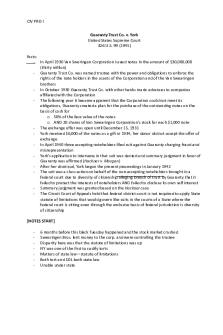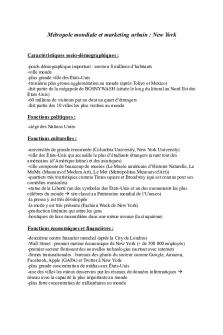Payton V. New York PDF

| Title | Payton V. New York |
|---|---|
| Author | Jose Chicaiza |
| Course | Introduction To Paralegal Studies |
| Institution | New York City College of Technology |
| Pages | 3 |
| File Size | 76.3 KB |
| File Type | |
| Total Downloads | 97 |
| Total Views | 163 |
Summary
it was out first assignment...
Description
Supreme Court of United States of America Payton V New York Citation Payton v New York, 445 U.S. 573, 100 S. Ct. 1371, 63 L. Ed. 2d 639 (1980)
Procedural History The New York court of appeals upheld both Payton’s and Riddick’s convictions. Both appealed to the Supreme Court of the United States.
Statement of Facts The police officers at the scene believe that Mr. Payton was responsible for murdering a gas station manager two days prior to his arrest. Multiple officers went into Mr. Payton’s apartment and when there was no response from inside his apartment, they forcibly entered his home. Upon entering, the officers saw a shell casing in plain sight that would later be admitted as evidence. The police officers arrested Mr. Payton in 1974, three years after the two robberies that he was charged for were committed. Again, the police entered his home without a warrant, and they found narcotics in a drawer two feet from where Mr. Payton was arrested.
Issue Whether there is an illegal search and seizure when a police searches a home during the course of an arrest and seize evidence where there is probable cause, but no exigent circumstances?
Holding The Fourth Amendment of the United States Constitution prohibits warrantless entries for searches of homes, absent exigent circumstances, even when there is probable cause.
Analysis Yes it’s unconstitutional to search a home during a search and seizure when there is no arrest warrant and there are no exigent circumstances, as stated under the Fourth Amendment of the Constitution. The Supreme Court holds that a person’s home is a safeguard where constitutional rights are protected. It’s applicable when probable cause exists or when there is a statutory authority permitting the searches.
Dissent There are four main restrictions on house arrests that the dissent reasons that common law rule applies during constitutional safeguard which is that it has to involve a felony, the police need to demonstrate their presence and show identification, arrests need to be done in the morning, and probable cause. All four restrictions were met in both cases at issue according to the dissent, including that the defendants were both at home at the time of the incident, and therefore the convictions has been stand.
Concurrence According to United States v. Watson, Justice Harry Blackmun has condoned a warrantless arrest in a public space. He emphasized that the majority opinion here was not contrary to his earlier opinion. Discussion The Supreme Court differs the case of Watson, which allowed a warrantless arrest in a public space. According to the Supreme Court “arrest under exigent circumstances”, is a high
probability that a suspect is in danger or would flee the scene. The dissent argues that the term “exigent circumstances “is vague and will bring more problems within times....
Similar Free PDFs

Payton V. New York
- 3 Pages

Nebbia v New York
- 1 Pages

Lo-ji Sales Inc v. New York
- 2 Pages

Clinton v City of New York
- 1 Pages

New York Longitudinal Study
- 4 Pages

Ficha N°3 NEW YORK
- 1 Pages

New York Times Writing Prompts
- 2 Pages

Guaranty Trust Co. v. York
- 4 Pages
Popular Institutions
- Tinajero National High School - Annex
- Politeknik Caltex Riau
- Yokohama City University
- SGT University
- University of Al-Qadisiyah
- Divine Word College of Vigan
- Techniek College Rotterdam
- Universidade de Santiago
- Universiti Teknologi MARA Cawangan Johor Kampus Pasir Gudang
- Poltekkes Kemenkes Yogyakarta
- Baguio City National High School
- Colegio san marcos
- preparatoria uno
- Centro de Bachillerato Tecnológico Industrial y de Servicios No. 107
- Dalian Maritime University
- Quang Trung Secondary School
- Colegio Tecnológico en Informática
- Corporación Regional de Educación Superior
- Grupo CEDVA
- Dar Al Uloom University
- Centro de Estudios Preuniversitarios de la Universidad Nacional de Ingeniería
- 上智大学
- Aakash International School, Nuna Majara
- San Felipe Neri Catholic School
- Kang Chiao International School - New Taipei City
- Misamis Occidental National High School
- Institución Educativa Escuela Normal Juan Ladrilleros
- Kolehiyo ng Pantukan
- Batanes State College
- Instituto Continental
- Sekolah Menengah Kejuruan Kesehatan Kaltara (Tarakan)
- Colegio de La Inmaculada Concepcion - Cebu







